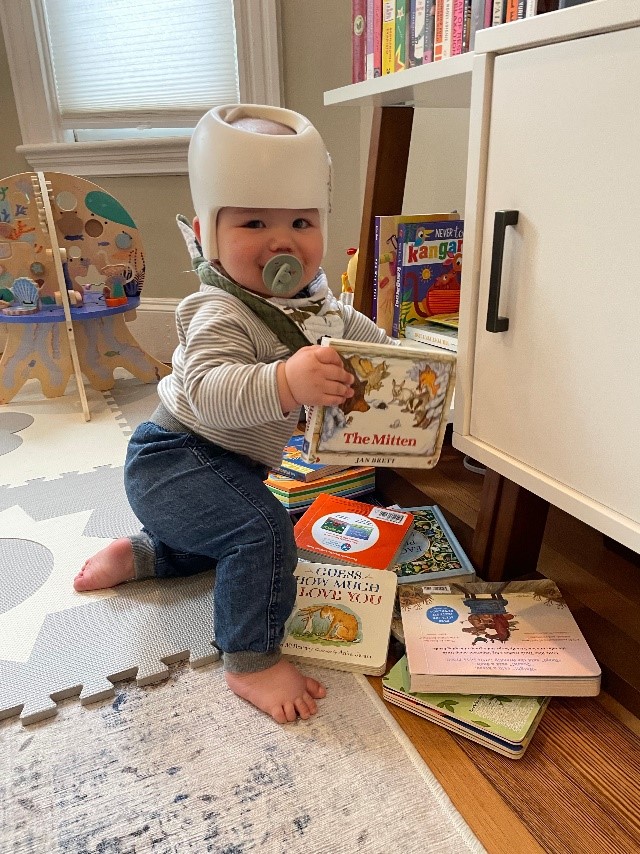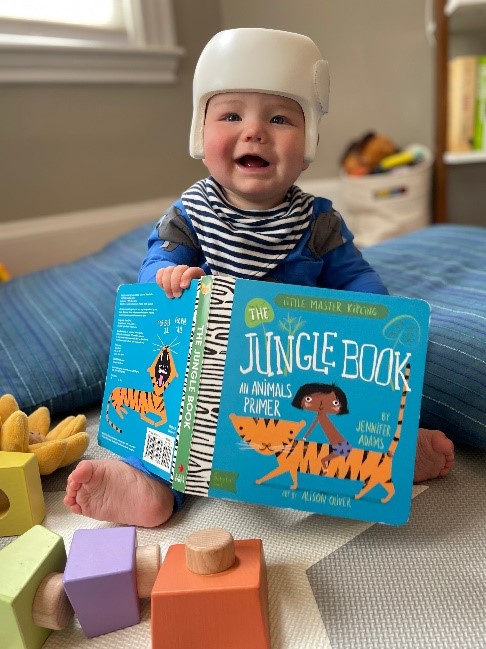Maxwell’s Plagiocephaly Story: “A Really Positive Experience”
Posted on
At 2 months old, Maxwell’s parents noticed he had a side preference—his head always seemed to be turned the same way, and that preferred side seemed to be flattened. They asked their pediatrician about it and were told that it might resolve on its own. It didn’t.
“By 4 months we were like, we need to get it evaluated,” says Maxwell’s dad Joe. When they took him in for another visit, their pediatrician told them that if they wanted to get Maxwell evaluated for plagiocephaly, their timing was perfect. “He did say we were in a sweet spot in terms of his age, so now was the time to be evaluated,” says mom Catey.

Maxwell has no problems eating, sleeping
or playing with the helmet on.
The pediatrician referred the family to Boston Children's Hospital, and helmeting was recommended. After a scan at Boston O&P’s Weymouth clinic, the fitting of Maxwell’s Boston Band was done by John Greaney, a Certified Orthotic Assistant and Certified Fitter-orthotics at Boston O&P of Boston Children's Hospital Waltham.
“John was great,” says Joe. “He made sure the helmet fit correctly and answered all our questions.” Not only did John explain how to clean the helmet and how to keep an eye out for any issues, Joe says, “He went above and beyond being available to us. He gave us his contact information and said we could contact him at any time.”
As an additional resource, John also referred Maxwell’s parents to Boston O&P’s Boston Band & Plagiocephaly Support Group on Facebook, which is run by Boston O&P clinicians and is designed to give parents of children wearing the Boston Band a place to ask for and receive professional advice from a known, expert source.
Minor Issues, Quickly Fixed
“The initial getting him into the helmet went really smoothly for us,” says Catey. “He’s been great, he doesn’t mind it at all,” adds Joe. Maxwell had no problem sleeping with the helmet on, and no problem with having it put on or taken off.
After wearing the helmet for a couple months, Maxwell experienced some irritation due to a small skin tag near his face, with the area getting a little red and swollen. John was able to see them the same day to make an adjustment to the helmet and resolve the issue.
Later, when the skin tag was removed and Maxwell had a stitch under the helmet, John did another adjustment to ensure Maxwell would experience no discomfort. “John resolved it quickly and there have been no other issues,” says Catey.
Plagiocephaly is Not the Parents’ Fault

After treatment with a Boston Band, Maxwell’s head is becoming more rounded.
One of Joe’s cousins had a baby a couple years ago that required helmeting, “so it was kind of on our radar,” he says. At the same time, says Catey, while they were aware of flat-head syndrome, they didn’t know much about what caused it. “I didn’t necessarily feel like I knew how it might develop,” says Catey. “We had that family context where we knew the baby had a helmet, but we didn’t really know how to prevent it.”
Many parents of babies with plagiocephaly worry that it might be their fault, or that they should have done something to prevent it.
Hearing from their pediatrician that they were not at fault, and that Maxwell’s plagiocephaly might not have been preventable at all, was a relief. “That was good to hear because we both sort of felt like we could have done more to prevent it,” says Catey.
“It was also helpful to hear that sometimes babies that are born early and grow really quickly are more likely to have it, and both of those things are true with Max.”
Getting Closer to “Normal”
Maxwell has been in his helmet for a few months now, and his parents have seen a lot of improvement.
“Maxwell has made great progress throughout his treatment and his head shape is looking great,” says clinician John Greaney.
“Every time we go in they do a measurement, and he is getting very close to normal,” confirms Joe.
“It has been a really positive experience,” says Catey. “Working with Boston O&P has been really unique. They have been super responsive and it has always been easy to get an appointment. You do have to go relatively frequently, but they make that process as easy as possible.”
“I really feel like we’re in good hands for this phase,” Catey adds. “Right now it seems like he’s had a helmet half his life, but looking back it will seem like just a blip.”

